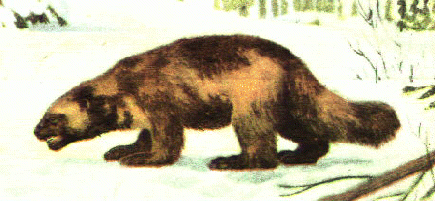Wolverine and Fire Part 2
 Wolverine did not need this fire. He was not cold or hungry.hungry. He had only made it to try out his new power. He was so excitedexcited by this that he decideddecided to keep going.going. He had hardlyly gottengotten out of sight of his first fire, when he decided to make a new one. After that, he made fires againagain and again, every few steps, untiluntil at last he had made so many that, finally,finally, his power gave out, because he had usedused it all up.
Wolverine did not need this fire. He was not cold or hungry.hungry. He had only made it to try out his new power. He was so excitedexcited by this that he decideddecided to keep going.going. He had hardlyly gottengotten out of sight of his first fire, when he decided to make a new one. After that, he made fires againagain and again, every few steps, untiluntil at last he had made so many that, finally,finally, his power gave out, because he had usedused it all up.
When he next collectedcollected a pile of maple bark and jumpedjumped over it, it did not burst into flames. By that time it had growngrown dark and was very cold, and he was, indeed,indeed, in need of a fire. He jumpedjumped and he jumped but he had no success. The piles of bark refusedrefused to catch fire. He had thrownthrown away his flint and steel and was very frightened,frightened, for it had got very cold. He kept on jumping but it grew so cold that at last he could jump no more. He lay down on the cold ground and he froze to death.
|
Comprehension Summarise what has happened so far in this fable. Clarify these words: hardly, collected, burst into flame, indeed, success. Retell the ending of the fable. Was your prediction correct? Make inferences or give opinions about:
What question could you ask about this fable? Visualise these uses of descriptive language: he was so excited; collected a pile of maple bark; he jumped and he jumped; grown dark; he was very frightened; he could jump no more; he lay down on the cold ground and froze to death. Make a connection with this chapter. What is the main idea or theme of this fable? What do you think the author is trying to tell us? |
Word Study Verb endings: What happens when we add s, ed or ing to: excite, decide, refuse, frighten, lie. Other affixes: What happens when we add prefixes and suffixes like ly, en to these words: hard, final, grow, throw, fright. Why might there be a silent t in catch? What two words make up these compound words: again, indeed.
|